六年级英语下册第二单元
六年级下册英语unit2课文翻译

六年级下册英语unit2课⽂翻译 在学习英语课⽂中遇到⼀些看不懂的单词或句⼦很影响对整篇课⽂的理解,下⾯店铺为同学们带来六年级下册英语unit2课⽂翻译,欢迎⼤家学习! 六年级下册英语unit2课⽂翻译:Let's try Wu Yifan is asking John about last weekend.Listen and circle. 吴⼀凡正在询问约翰有关上周末(的事情)。
听⼀听,圈⼀圈。
1.What did John do last weekend? 1.约翰上周末⼲什么了? A.He slept. A.他睡觉了。
B.He read a new film magazine. B.他看了⼀期新的电影杂志。
2.Are Wu Yifan and John going to meet Amy together? 2.吴⼀凡和约翰将要⼀起去见埃⽶吗? A.Yes,they are. A.是的,他们将要⼀起去见埃⽶。
B.No,they aren't. B.不,他们不将要⼀起去见埃⽶。
六年级下册英语unit2课⽂翻译:let's talk John:Hey,Amy.Let's go to the bookstore.I want to buy the new film magazine. 约翰:嘿,埃⽶。
让我们去书店吧。
我想买期新的电影杂志。
Amy:Oh,I read it last weekend. 埃⽶:哦,我上周末读过它了。
John:Was it interesting? 约翰:它有趣吗? Amy:Yes,it talked about a lot of new films.What did you do last weekend? Did you see a film? 埃⽶:是的,它讲了许多关于新电影(的事情)。
你上周末⼲什么了?你看电影了吗? John:No,I had a cold.I stayed at home all weekend and slept. 约翰:没有,我感冒了。
人教版pep小学六年级下册英语第二单元试卷和听力测试及答案
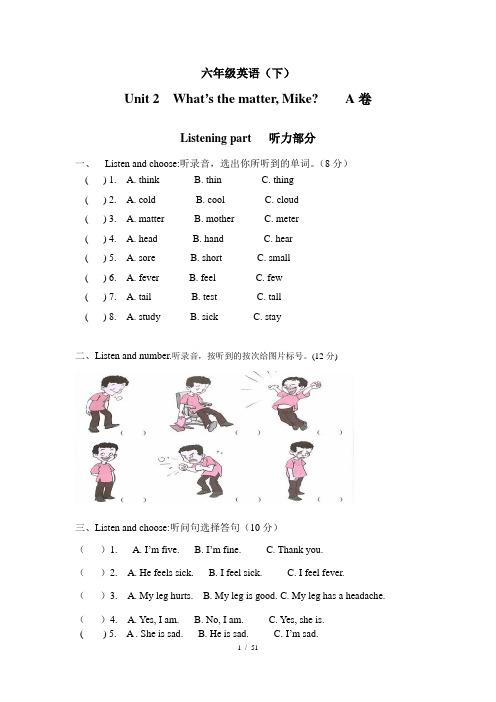
六年级英语(下)Unit 2 What’s the matter, Mike? A卷Listening part 听力部分一、Listen and choose:听录音,选出你所听到的单词。
(8分)( ) 1. A. think B. thin C. thing( ) 2. A. cold B. cool C. cloud( ) 3. A. matter B. mother C. meter( ) 4. A. head B. hand C. hear( ) 5. A. sore B. short C. small( ) 6. A. fever B. feel C. few( ) 7. A. tail B. test C. tall( ) 8. A. study B. sick C. stay二、Listen and number.听录音,按听到的按次给图片标号。
(12分)三、Listen and choose:听问句选择答句(10分)()1. A. I’m five. B. I’m fine. C. Thank you.()2. A. He feels sick. B. I feel sick. C. I feel fever.()3. A. My leg hurts. B. My leg is good. C. My leg has a headache.()4. A. Yes, I am. B. No, I am. C. Yes, she is.( ) 5. A . She is sad. B. He is sad. C. I’m sad.四、Listen and fill in the blanks.听音,补全句子。
(10分)Writing Part笔答部分五、Read and translate.争当小小翻译家。
(10分)疲劳的兴奋的无聊的愉快的生气的六、Read and match.(只写序号)(10分)( ) 1. failed the math test A. 得了流感( ) 2. get the flu B.吃点药( ) 3. a football match C. 因……而发笑( ) 4. stay in bed D. 数学考试不及格( ) 5. laugh at E. 踢球( ) 6. kick the ball F. 进行一次长途旅行( ) 7. a little G. 有些( ) 8. take some medicine H. 一场足球比赛( ) 9. a few days I. 几天( ) 10. go on a big trip J. 卧床休息七、Read and choose:单项选择(16分)( ) 1. Please stay ____ bed for a few days. A. to B. in C. for ( ) 2. If you sick, see the doctor. A. is B. are C. am( ) 3. Amy very sad. What’s wrong her?A. looks, withB. look, withC. looks, to( ) 4. does John feel? He’s sad. A. What B. How C. Where ( ) 5. I’m sorry hear that? A. for B. to C. in ( ) 6. --- I failed the math test. ---A. I’m sorry to hear that.B. You are luck.C. Oh, that’s bad. ( ) 7. Some feel sick the winter.A. people, inB. peoples, inC. people, at( ) 8. My arm . A. is hurt B. hurt C. hurts八、将单词与对应的色彩连线:(4分)healthy sad angry very very sadblue pink black red九、Make sentences.连词成句我最棒。
六年级下册英语二单元知识点归纳
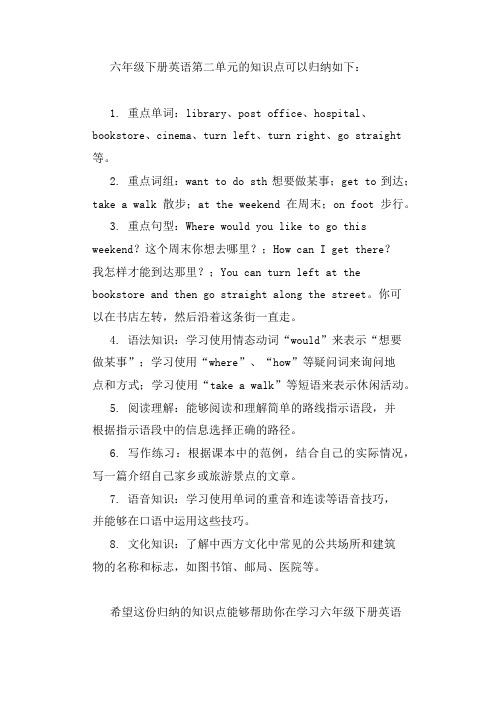
六年级下册英语第二单元的知识点可以归纳如下:
1. 重点单词:library、post office、hospital、bookstore、cinema、turn left、turn right、go straight 等。
2. 重点词组:want to do sth想要做某事;get to到达;take a walk散步;at the weekend在周末;on foot步行。
3. 重点句型:Where would you like to go this weekend?这个周末你想去哪里?;How can I get there?
我怎样才能到达那里?;You can turn left at the bookstore and then go straight along the street。
你可
以在书店左转,然后沿着这条街一直走。
4. 语法知识:学习使用情态动词“would”来表示“想要
做某事”;学习使用“where”、“how”等疑问词来询问地
点和方式;学习使用“take a walk”等短语来表示休闲活动。
5. 阅读理解:能够阅读和理解简单的路线指示语段,并
根据指示语段中的信息选择正确的路径。
6. 写作练习:根据课本中的范例,结合自己的实际情况,写一篇介绍自己家乡或旅游景点的文章。
7. 语音知识:学习使用单词的重音和连读等语音技巧,
并能够在口语中运用这些技巧。
8. 文化知识:了解中西方文化中常见的公共场所和建筑
物的名称和标志,如图书馆、邮局、医院等。
希望这份归纳的知识点能够帮助你在学习六年级下册英语
第二单元时更加轻松。
六年级下册英语二单元课文

六年级下册英语二单元课文Unit 2 Last weekend第二单元上周末Main scene (教材页码P12-13)原文:What did you do last weekend?翻译:你上周末做什么了?原文:I cleaned my room and washed my clothes on Saturday.翻译:我周六打扫了房间并洗了衣服。
原文:Did you play football with Zhang Peng?翻译:你和张鹏踢足球了吗?原文:Yes, I did. We played football on Sunday.翻译:是的。
我们周日踢足球了。
A Let's try(教材页码P14)一起试试原文:Sarah and Mike are talking about this weekend. Listen and circle. 翻译:萨拉和迈克在讨论这周末。
听并圈出。
原文:Tomorrow is Monday. We'll have class again soon.翻译:明天是周一。
我们很快又要上课了。
原文:Yes, we will.翻译:是的。
原文:How was your weekend, Mike?翻译:迈克,那你的周末怎么样?原文:It was OK. I cleaned my room and I watched TV.翻译:还不错。
我打扫了房间还看来电视。
原文:I'm going to call my grandparents now. They're in London. 翻译:我现在要给祖父母打电话。
他们在伦敦。
原文:OK, bye.翻译:好,拜拜。
A Let's talk(教材页码P14)一起说吧原文:Mike: Hi, Grandpa. How are you? How was your weekend? 翻译:你好,祖父。
六年级下册英语二单元知识点归纳
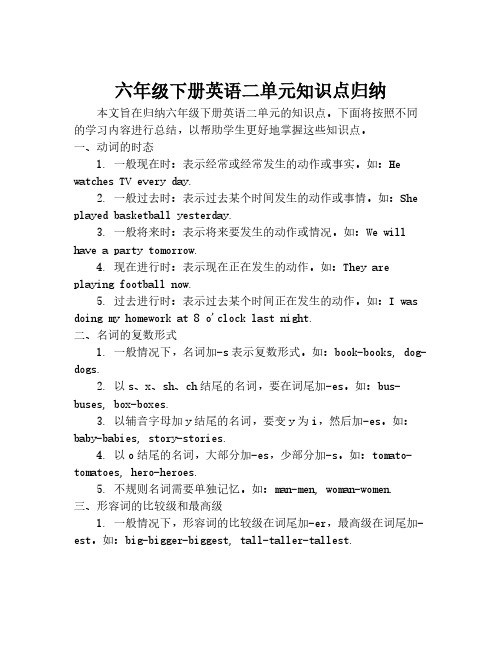
六年级下册英语二单元知识点归纳 本文旨在归纳六年级下册英语二单元的知识点。
下面将按照不同的学习内容进行总结,以帮助学生更好地掌握这些知识点。
一、动词的时态 1. 一般现在时:表示经常或经常发生的动作或事实。
如:He watches TV every day. 2. 一般过去时:表示过去某个时间发生的动作或事情。
如:She played basketball yesterday. 3. 一般将来时:表示将来要发生的动作或情况。
如:We will have a party tomorrow. 4. 现在进行时:表示现在正在发生的动作。
如:They are playing football now. 5. 过去进行时:表示过去某个时间正在发生的动作。
如:I was doing my homework at 8 o'clock last night.二、名词的复数形式 1. 一般情况下,名词加-s表示复数形式。
如:book-books, dog-dogs. 2. 以s、x、sh、ch结尾的名词,要在词尾加-es。
如:bus-buses, box-boxes. 3. 以辅音字母加y结尾的名词,要变y为i,然后加-es。
如:baby-babies, story-stories. 4. 以o结尾的名词,大部分加-es,少部分加-s。
如:tomato-tomatoes, hero-heroes. 5. 不规则名词需要单独记忆。
如:man-men, woman-women.三、形容词的比较级和最高级 1. 一般情况下,形容词的比较级在词尾加-er,最高级在词尾加-est。
如:big-bigger-biggest, tall-taller-tallest. 2. 以一个辅音字母加一个元音字母结尾的单音节词,要双写最后一个辅音字母,再加-er或-est。
如:hot-hotter-hottest, big-bigger-biggest. 3. 以y结尾的形容词,要变y为i,再加-er或-est。
PEP英语六年级下册Unit2语法归纳
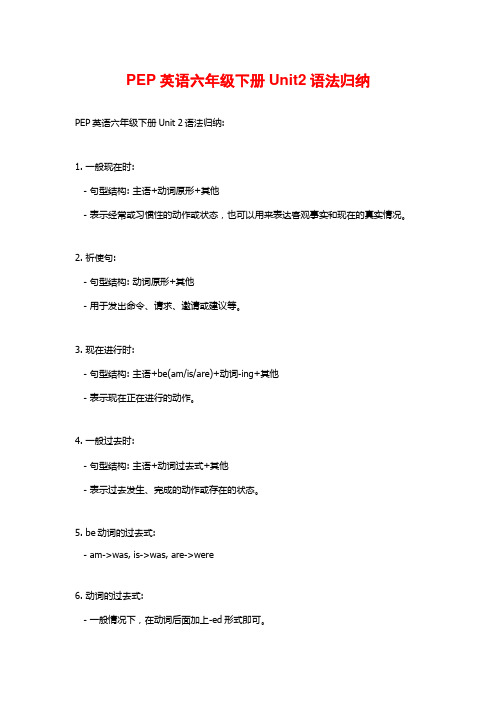
PEP英语六年级下册Unit2语法归纳
PEP英语六年级下册Unit 2语法归纳:
1. 一般现在时:
- 句型结构: 主语+动词原形+其他
- 表示经常或习惯性的动作或状态,也可以用来表达客观事实和现在的真实情况。
2. 祈使句:
- 句型结构: 动词原形+其他
- 用于发出命令、请求、邀请或建议等。
3. 现在进行时:
- 句型结构: 主语+be(am/is/are)+动词-ing+其他
- 表示现在正在进行的动作。
4. 一般过去时:
- 句型结构: 主语+动词过去式+其他
- 表示过去发生、完成的动作或存在的状态。
5. be动词的过去式:
- am->was, is->was, are->were
6. 动词的过去式:
- 一般情况下,在动词后面加上-ed形式即可。
7. 带有情态动词的英语句子:
- 情态动词可以用来表示说话人对某种动作或状态的评价、推测、建议等。
8. 比较级和最高级:
- 比较级用于比较两者之间的程度或数量,最高级则表示三者或三者以上的程度或数量的最高。
9. 数词:
- 用来表示具体的数量。
10. 及物动词和不及物动词:
- 及物动词后面必须加上宾语来完成意思,而不及物动词在意思上已经完整。
这些是PEP英语六年级下册Unit 2的一些语法要点,希望对你有帮助!。
六年级下册英语第二单元知识点
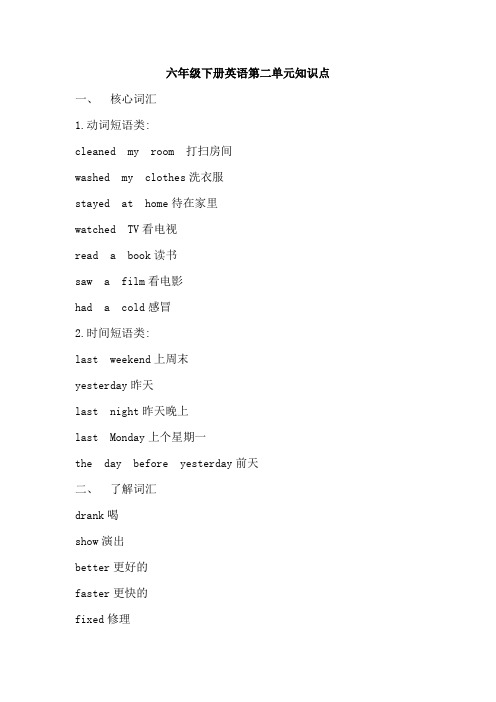
六年级下册英语第二单元知识点一、核心词汇1.动词短语类:cleaned my room 打扫房间washed my clothes洗衣服stayed at home待在家里watched TV看电视read a book读书saw a film看电影had a cold感冒2.时间短语类:last weekend上周末yesterday昨天last night昨天晚上last Monday上个星期一the day before yesterday前天二、了解词汇drank喝show演出better更好的faster更快的fixed修理broken破损的anything else其他的事情三、核心句型1.How was your weekend?你周末过得怎么样?2.—What did you do last weekend?上周末你干什么了? —I played football.我踢足球了。
解读: What did + 主语+ do + 过去时间?用来询问他人过去某一时间做了什么事情。
回答用“主语+ 动词过去式+ 其他.”。
3.—Did you read books?你读书了吗?—Yes, I did./No, I didn’t.是的,我读了。
/不,我没读。
解读: Did + 主语+ 动词原形+ 其他?用来确定他人过去某个时间是否做了某事。
回答用“Yes, 主语+ did./No, 主语+ didn’t.”。
四、了解句型I stayed at home with your grandma. 我和你奶奶待在家里。
解读: with在这里指“和……一起”。
译林版英语六年级下册第二单元知识点和试卷

Unit 2 Good habits【词汇】1. habit 习惯2. never 从不3. late 迟地,晚地4. finish 完成5. tidy 干净的,整齐的6. fast 快7. bad 坏的,不好的8. sleepy 困的,困倦的9. slowly 慢慢地10. badly 差地,不好地11. put…in order把……整理得井井有条12. last night 昨夜13. go into 走进,走入14. bedtime 睡觉时间,就寝时间【词组短语】1. try to form good learning habits 努力养成良好的学习习惯2. a good/bad boy一个好/坏男孩3. have many good/bad habits有许多好/坏习惯4. get up early 早起5. never go to bed late 从不晚睡6. brush one’s teeth刷牙7. before bedtime 在睡觉前8. at home 在家9. put sth in order 把东西放整齐10. finish one’s homework完成(某人的)作业11. before dinner 在吃晚饭前12. listen to the teachers 听老师讲13. at school 在校14. do well 表现好15. keep the room clean and tidy 保持房间整洁16. help one’s parents 帮父母17. do one’s homework 做(某人的)作业18. at night 在夜晚,在晚上19. feel sleepy 犯困20. know sb well 对某人了解21. last night 昨晚22. walk fast 走得快23. come to see sb 来看某人24. show sb around 带某人参观25. go into 走进26. living room 起居室27. on the floor 在地板上28. under the bed 在床下29. run fast/slowly跑得快/慢30. walk fast/slowly走得快/慢31. sing well/ badly唱得好/坏32. do well/badly做得好/坏33. get up early/ late起得早/晚34. go to bed early /late睡得早/晚35. go to school early/late上学早/晚36. on time 准时37. run through the grass 奔跑穿过草地38. wash one’s face 洗(某人的)脸39. pick one 挑一张【语法】本单元继续学习副词及其用法。
六年级下册第二单元英语
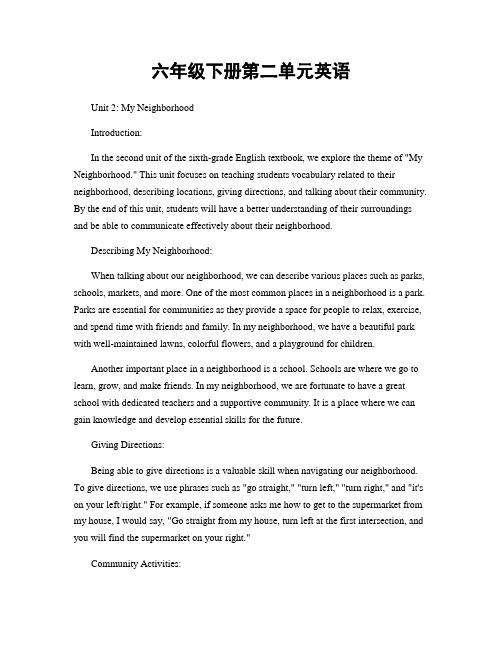
六年级下册第二单元英语Unit 2: My NeighborhoodIntroduction:In the second unit of the sixth-grade English textbook, we explore the theme of "My Neighborhood." This unit focuses on teaching students vocabulary related to their neighborhood, describing locations, giving directions, and talking about their community. By the end of this unit, students will have a better understanding of their surroundings and be able to communicate effectively about their neighborhood.Describing My Neighborhood:When talking about our neighborhood, we can describe various places such as parks, schools, markets, and more. One of the most common places in a neighborhood is a park. Parks are essential for communities as they provide a space for people to relax, exercise, and spend time with friends and family. In my neighborhood, we have a beautiful park with well-maintained lawns, colorful flowers, and a playground for children.Another important place in a neighborhood is a school. Schools are where we go to learn, grow, and make friends. In my neighborhood, we are fortunate to have a great school with dedicated teachers and a supportive community. It is a place where we can gain knowledge and develop essential skills for the future.Giving Directions:Being able to give directions is a valuable skill when navigating our neighborhood. To give directions, we use phrases such as "go straight," "turn left," "turn right," and "it's on your left/right." For example, if someone asks me how to get to the supermarket from my house, I would say, "Go straight from my house, turn left at the first intersection, and you will find the supermarket on your right."Community Activities:Communities often organize various activities to bring people together and foster a sense of unity. In my neighborhood, we have annual events like a neighborhood picnic, a charity run, and a cultural festival. These events provide an opportunity for residents to socialize, showcase their talents, and learn about different cultures. Such activities help create a strong bond among neighbors and promote a sense of belonging.Safety in the Neighborhood:Safety is a crucial aspect of any neighborhood. It is important to feel secure and protected in our surroundings. To ensure safety, communities often have measures such as streetlights, security guards, and neighborhood watch programs. In my neighborhood, we have well-lit streets, security cameras, and regular patrols by security personnel. These precautions help deter potential criminal activities and create a safe environment for everyone.Conclusion:In conclusion, the second unit of the sixth-grade English textbook focuses on the theme of "My Neighborhood." Through this unit, students learn how to describe their neighborhood, give directions, and discuss community activities. Understanding our surroundings and being able to communicate effectively about our neighborhood is essential for building strong communities. By the end of this unit, students will have a better appreciation for their neighborhood and be able to navigate it confidently.。
人教版小学六年级英语下册Unit2单元测试卷带答案
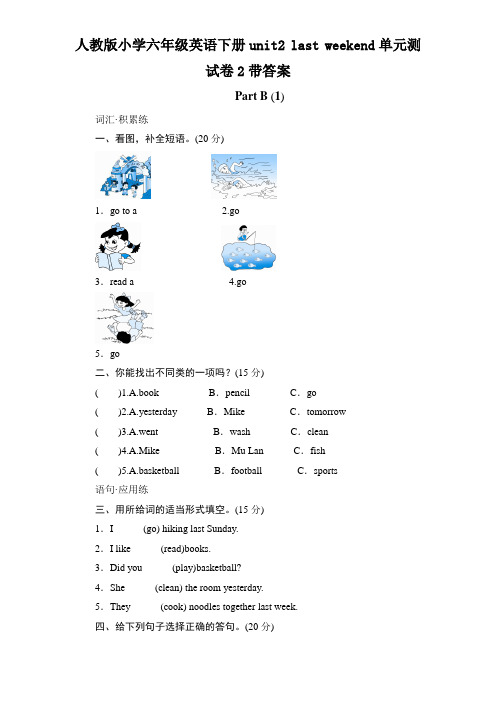
人教版小学六年级英语下册unit2 last weekend单元测试卷2带答案Part B (1)词汇·积累练一、看图,补全短语。
(20分)1.go to a______ 2.go______3.read a______ 4.go______5.go______二、你能找出不同类的一项吗?(15分)()1.A.book B.pencil C.go()2.A.yesterday B.Mike C.tomorrow()3.A.went B.wash C.clean()4.A.Mike B.Mu Lan C.fish()5.A.basketball B.football C.sports语句·应用练三、用所给词的适当形式填空。
(15分)1.I______(go) hiking last Sunday.2.I like______(read)books.3.Did you______(play)basketball?4.She______(clean) the room yesterday.5.They______(cook) noodles together last week.四、给下列句子选择正确的答句。
(20分)()1.Where did you go?A.Played football. B.Shanghai. C.I go to Shanghai.()2.What did Mike do?A.He did his homework. B.She did her housework.C.He goes to school.()3.Did Wu Yifan go fishing?A.Yes,he did. B.No,she didn't. C.Yes,she didn't.()4.When did you read a book?A.I readed a book at 6:00. B.I read a book yesterday.C.Tomorrow.()5.How did you go to school?A.On feet. B.By foot. C.On foot.五、你能找出下列句子中的错误吗?找出来并改一改。
PEP人教版小学英语六年级下册Unit 2单元知识梳理总结
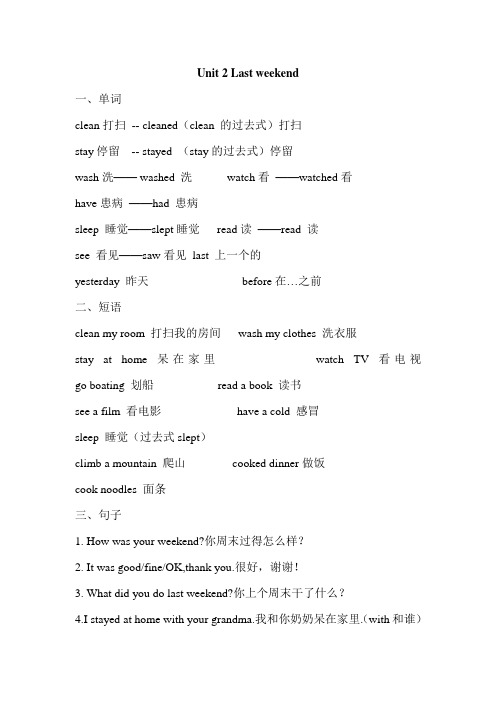
Unit 2 Last weekend一、单词clean打扫-- cleaned(clean 的过去式)打扫stay停留-- stayed (stay的过去式)停留wash洗—— washed 洗watch看——watched看have患病——had 患病sleep 睡觉——slept睡觉read读——read 读see 看见——saw看见last 上一个的yesterday 昨天before在…之前二、短语clean my room 打扫我的房间wash my clothes 洗衣服stay at home 呆在家里watch TV 看电视go boating 划船read a book 读书see a film 看电影have a cold 感冒sleep 睡觉(过去式slept)climb a mountain 爬山cooked dinner做饭cook noodles 面条三、句子1. How was your weekend?你周末过得怎么样?2. It was good/fine/OK,thank you.很好,谢谢!3. What did you do last weekend?你上个周末干了什么?4.I stayed at home with your grandma.我和你奶奶呆在家里.(with和谁)5. Did you do anything else?你还做了其他什么事吗?6. Yes,I cleaned my room and washed my clothes.是的,我扫了房间,还洗了衣服。
7.I want to buy the new film magazine.我想买期新的电影杂志。
8.Did you see a film?你看电影了吗?No,I didn’t .I had a cold. I stayed at home all weekend and slept.没有,我感冒了。
(完整)六年级英语下册第二单元

(完整)六年级英语下册第二单元六年级英语下册第二单元
1. 单词研究
在第二单元中,我们研究了许多新的英语单词。
以下是一些重要的单词及其意思:
1. apple - 苹果
2. banana - 香蕉
3. cat - 猫
4. dog - 狗
5. elephant - 大象
6. fish - 鱼
7. grape - 葡萄
8. hat - 帽子
9. ice cream - 冰淇淋
10. juice - 果汁
2. 句子练
除了研究单词,我们还练了构造简单的英语句子。
以下是一些例子:
1. I like apples. - 我喜欢苹果。
2. She has a cat. - 她有一只猫。
3. We can eat ice cream. - 我们可以吃冰淇淋。
4. They drink juice. - 他们喝果汁。
3. 对话理解
我们在这个单元中也研究了如何理解和回答简单的对话。
以下是一个例子:
A: Do you like bananas? - 你喜欢香蕉吗?
B: Yes, I do. - 是的,我喜欢。
4. 综合练
最后,我们进行了一些综合练,包括听力和阅读理解。
这些练帮助我们巩固了所学的单词和句子。
总结
第二单元是一个简单而有趣的英语研究单元。
通过研究新的单词、构造句子、理解对话和进行综合练,我们提高了英语能力并增加了对英语的兴趣。
六年级下册英语第二单元知识点笔记
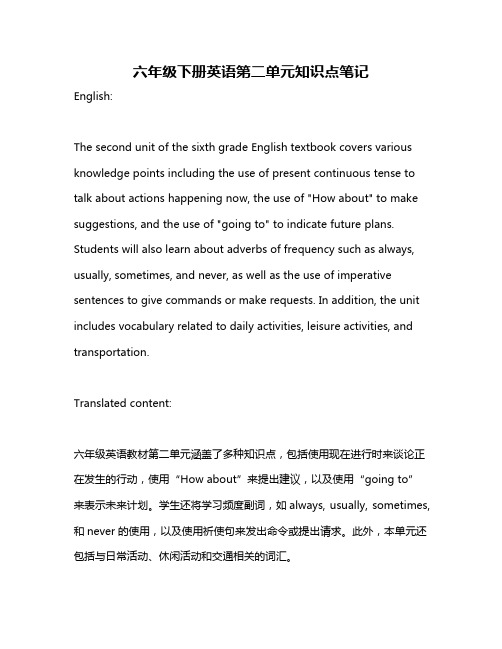
六年级下册英语第二单元知识点笔记English:The second unit of the sixth grade English textbook covers various knowledge points including the use of present continuous tense to talk about actions happening now, the use of "How about" to make suggestions, and the use of "going to" to indicate future plans. Students will also learn about adverbs of frequency such as always, usually, sometimes, and never, as well as the use of imperative sentences to give commands or make requests. In addition, the unit includes vocabulary related to daily activities, leisure activities, and transportation.Translated content:六年级英语教材第二单元涵盖了多种知识点,包括使用现在进行时来谈论正在发生的行动,使用“How about”来提出建议,以及使用“going to”来表示未来计划。
学生还将学习频度副词,如always, usually, sometimes,和never的使用,以及使用祈使句来发出命令或提出请求。
此外,本单元还包括与日常活动、休闲活动和交通相关的词汇。
英语六年级下册第二单元
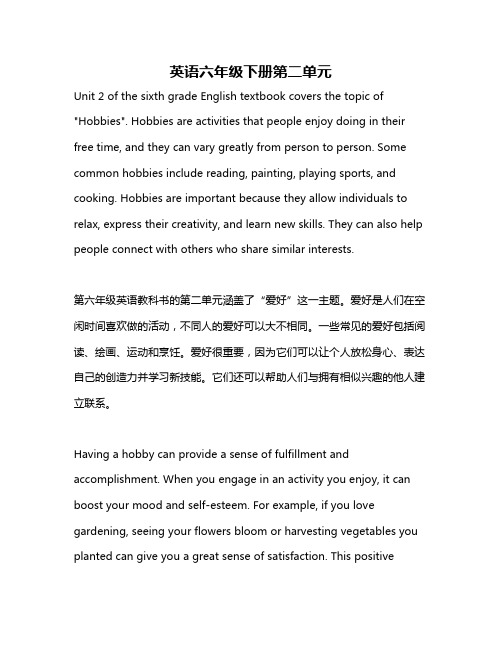
英语六年级下册第二单元Unit 2 of the sixth grade English textbook covers the topic of "Hobbies". Hobbies are activities that people enjoy doing in their free time, and they can vary greatly from person to person. Some common hobbies include reading, painting, playing sports, and cooking. Hobbies are important because they allow individuals to relax, express their creativity, and learn new skills. They can also help people connect with others who share similar interests.第六年级英语教科书的第二单元涵盖了“爱好”这一主题。
爱好是人们在空闲时间喜欢做的活动,不同人的爱好可以大不相同。
一些常见的爱好包括阅读、绘画、运动和烹饪。
爱好很重要,因为它们可以让个人放松身心、表达自己的创造力并学习新技能。
它们还可以帮助人们与拥有相似兴趣的他人建立联系。
Having a hobby can provide a sense of fulfillment and accomplishment. When you engage in an activity you enjoy, it can boost your mood and self-esteem. For example, if you love gardening, seeing your flowers bloom or harvesting vegetables you planted can give you a great sense of satisfaction. This positivefeeling can carry over into other areas of your life, making you happier and more confident overall.拥有一个爱好可以给人一种满足感和成就感。
六年级英语下册【词汇选择】Unit2Lastweekend题型专项训练(含答案)(人教PEP)
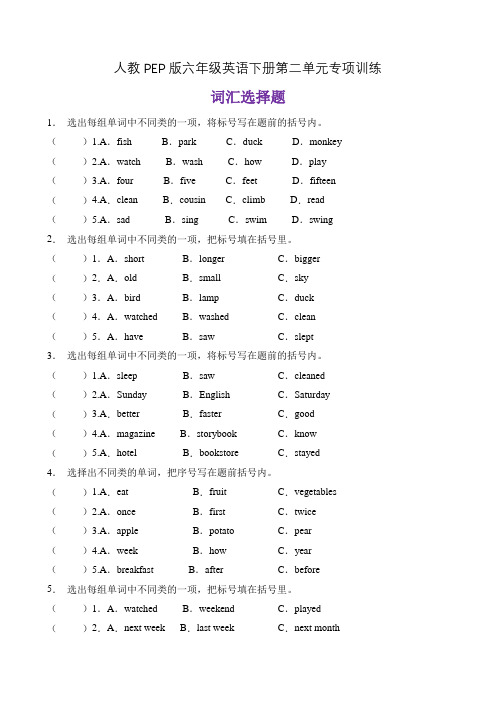
人教PEP版六年级英语下册第二单元专项训练词汇选择题1.选出每组单词中不同类的一项,将标号写在题前的括号内。
()1.A.fish B.park C.duck D.monkey()2.A.watch B.wash C.how D.play()3.A.four B.five C.feet D.fifteen()4.A.clean B.cousin C.climb D.read()5.A.sad B.sing C.swim D.swing2.选出每组单词中不同类的一项,把标号填在括号里。
()1.A.short B.longer C.bigger()2.A.old B.small C.sky()3.A.bird B.lamp C.duck()4.A.watched B.washed C.clean()5.A.have B.saw C.slept3.选出每组单词中不同类的一项,将标号写在题前的括号内。
()1.A.sleep B.saw C.cleaned()2.A.Sunday B.English C.Saturday()3.A.better B.faster C.good()4.A.magazine B.storybook C.know()5.A.hotel B.bookstore C.stayed4.选择出不同类的单词,把序号写在题前括号内。
()1.A.eat B.fruit C.vegetables()2.A.once B.first C.twice()3.A.apple B.potato C.pear()4.A.week B.how C.year()5.A.breakfast B.after C.before5.选出每组单词中不同类的一项,把标号填在括号里。
()1.A.watched B.weekend C.played()2.A.next week B.last week C.next month()3.A.stayed B.waited C.do()4.A.clothes B.children C.nice()5.A.cooks B.washed C.drank6.选出画线部分读音与其他三个不同的一项,并将其序号填入题前的括号内。
pep小学英语六年级下册第二单元测试题及答案
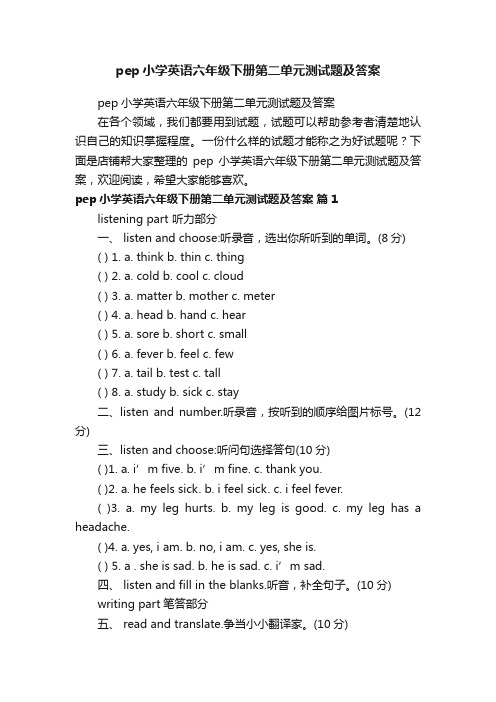
pep小学英语六年级下册第二单元测试题及答案pep小学英语六年级下册第二单元测试题及答案在各个领域,我们都要用到试题,试题可以帮助参考者清楚地认识自己的知识掌握程度。
一份什么样的试题才能称之为好试题呢?下面是店铺帮大家整理的pep小学英语六年级下册第二单元测试题及答案,欢迎阅读,希望大家能够喜欢。
pep小学英语六年级下册第二单元测试题及答案篇1listening part 听力部分一、 listen and choose:听录音,选出你所听到的单词。
(8分)( ) 1. a. think b. thin c. thing( ) 2. a. cold b. cool c. cloud( ) 3. a. matter b. mother c. meter( ) 4. a. head b. hand c. hear( ) 5. a. sore b. short c. small( ) 6. a. fever b. feel c. few( ) 7. a. tail b. test c. tall( ) 8. a. study b. sick c. stay二、listen and number.听录音,按听到的顺序给图片标号。
(12分)三、listen and choose:听问句选择答句(10分)( )1. a. i’m five. b. i’m fine. c. thank you.( )2. a. he feels sick. b. i feel sick. c. i feel fever.( )3. a. my leg hurts. b. my leg is good. c. my leg has a headache.( )4. a. yes, i am. b. no, i am. c. yes, she is.( ) 5. a . she is sad. b. he is sad. c. i’m sad.四、 listen and fill in the blanks.听音,补全句子。
六年级下册英语第二单元作文结构

六年级下册英语第二单元作文结构Unit 2 My Day。
Hello everyone! Today I'm going to share with you my typical day. My name is Peter, and I am a sixth-grade student. I believe that having a well-structured day is essential for a successful and productive life. So, let's dive into my daily routine!Every morning, my alarm clock goes off at 6:30 am. I quickly get out of bed and start my day by freshening up and getting dressed. After that, I head to the kitchen to have a nutritious breakfast with my family. We usually have cereal, toast, and a glass of milk. Breakfast is the most important meal of the day, and it gives me the energy I needto start my day.At 7:30 am, I leave my house and walk to school. It takes me about 15 minutes to reach there. School starts at 8:00 am, and the first thing we do is the morning assembly. We sing the national anthem and listen to important announcements. Then, we head to our respective classrooms and begin our lessons.During the school day, we have various subjects such as English, Math, Science, and Social Studies. I enjoy English the most because I love reading and writing. We have a fantastic English teacher who makes the lessons engaging and interactive. In Math, I find solving problems challenging but exciting. Science experiments are always fascinating, and Social Studies helps me understand the world around me.After four periods, we have a short break where we can chat with our friends and have a snack. I usually bring a sandwich or a piece of fruit from home. After the break, we continue with our remaining lessons until lunchtime.Lunchtime is my favorite part of the day. We have a cafeteria at school where we can choose from a variety of healthy and delicious meals. I usually have a balanced meal consisting of rice, vegetables, and chicken. Sometimes, I treat myself to a dessert like a piece of cake or a fruit salad. After lunch, we have a short recess where we can play games or relax.The afternoon is dedicated to extracurricular activities. I am a member of the school's basketball team, so I have basketball practice three times a week. I love playing basketball as it helps me stay active and improve my teamwork skills. On other days, I attend art club where I get to explore my creativity through painting and drawing.After school, I head home and take a short break. I spend some time playing with my younger sister or reading a book. Then, I start working on my homework. I make sure to complete all my assignments before dinner so that I can have some free time in the evening.In the evening, I have dinner with my family. We talk about our day and share interesting stories. After dinner, I spend some time relaxing and watching my favorite TV show. Before going to bed, I brush my teeth and get ready for the next day.Finally, at around 9:30 pm, it's time for bed. I make sure to get enough sleep as it is crucial for my overall well-being and academic performance.That's a glimpse into my typical day. Having a well-structured routine helps me stay organized and make the most out of each day. I believe that by following a consistent schedule, I can achieve my goals and succeed in life. Thank you for reading, and I hope you enjoyed learning about my day!。
六年级下册英语第二单元作文加感受

六年级下册英语第二单元作文加感受全文共6篇示例,供读者参考篇1Unit 2: A World of WondersWow, Unit 2 in our English textbook was such an amazing adventure! It took us on a journey exploring some of the most incredible wonders of the natural world. I felt like a brave explorer venturing into uncharted territories with each lesson. Let me tell you all about it!The unit started off by teaching us about the seven natural wonders of the world. I'll never forget poring over the beautiful pictures of places like the Great Barrier Reef, the breathtaking Northern Lights, and the mighty Amazon rainforest. They all looked so magical and mysterious. I couldn't believe such amazing sights existed on our planet!We learned so many fascinating facts too. Did you know the Great Pyramid of Giza is the last remaining wonder of the ancient world? Or that the Northern Lights are caused by charged particles from the sun colliding with gases in our atmosphere? Mind-blowing stuff! Reading about these natural wonders filledme with a sense of wonder and appreciation for the incredible world we live in.Next, we dove deep into exploring different habitats and ecosystems around the globe. From scorching hot deserts to freezing cold tundras, rainforests teeming with life to vast, empty stretches of the ocean depths. Each environment was more incredible than the last! We examined the unique plants and animals that have adapted to survive in these extreme conditions.I was awed by their resilience and the ingenious ways they've evolved to thrive.My favorite part was our in-depth look at coral reefs. Who knew these underwater cities were home to such a kaleidoscope of vivid colors and crazy creatures? The pictures of the clownfish darting in and out of the waving tentacles of the anemones looked like scenes from another world. I learned how the health of coral reefs is extremely important to maintaining balance in the ocean. It made me want to do my part to take care of these fragile ecosystems.Looking back, this unit wasn't just about gaining knowledge – it inspired me to appreciate the staggering beauty and diversity of our planet. From the tiniest coral polyp to the vastest desert, everything is interconnected in wonderfully complexways. I feel so lucky to live in a world jam-packed with such incredible natural wonders! This unit has motivated me to take better care of the environment and be a responsible global citizen.I can't wait to see what adventures await us in the next unit. Maybe we'll be venturing into outer space to explore themind-bending mysteries of the cosmos. One thing's for sure, learning English is proving to be an exhilarating journey ofnon-stop discoveries! Bring it on!篇2My Thoughts on Unit 2 of Our English BookThis past unit in our English book was all about discussing different countries and cultures around the world. At first, I wasn't too excited about it because I thought it would just be a bunch of facts to memorize. But it actually turned out to be really interesting learning about all the unique traditions and customs in different places!One of the first countries we learned about was India. I already knew a little bit about Indian culture from movies and TV shows, like how they wear colorful clothing and celebrate big festivals. But I didn't realize how diverse India is with so manydifferent languages, religions, and ethnic groups. It's amazing that such a huge country with over a billion people can have so much variety!We watched videos of traditional Indian dances, which looked so beautiful and intricate. The costumes were just gorgeous with all the sparkling fabrics and jewels. I loved the foot movements especially - it seems incredibly hard to move your feet that quickly! We also learned about some major Hindu festivals like Diwali, the festival of lights. Setting off fireworks and decorating with oil lamps sounds like so much fun. I told my mom we should try decorating our house with lamps for Diwali this year.Another really cool country we studied was Kenya in East Africa. I had never heard of some of the ethnic groups there like the Maasai and Samburu people. Their colorful beaded jewelry and cultural traditions of celebrating coming-of-age ceremonies sounded so fascinating. I thought it was awesome how the Maasai warriors have to go through these intense tests of bravery and endurance by things like drinking bitter drinks or being whipped! Not that I would ever want to go through that myself, but their cultures seem to value courage and strength so much.One tradition I thought was really neat from Kenya was the Maasai people's practice of drinking blood from cattle. I know it may sound gross, but they believe it gives them nutrients and connects them to their livestock, which are so important in their semi-nomadic lifestyle. Just thinking about drinking blood makes me feel squeamish, but I can understand why it's meaningful to them within their culture and beliefs.We also read about some interesting cultural traditions from countries likeJapan and Peru. In Japan, there are so many unique customs like taking off your shoes indoors, using chopsticks for meals, and special tea ceremonies. Everything seems to have an air of tranquility and respect. One thing I found really cool was the practice of forest bathing or "shinrin-yoku" where people go out and intentionally appreciate nature to reduce stress. It makes me want to go hiking and try being more mindful in the outdoors.From Peru, we learned about the ancient Incan culture and sites like Machu Picchu, which look absolutely breathtaking from the pictures and videos we saw. I had no idea the Incas were such skilled builders and engineers with all their precisely constructed cities and roads through the mountains. Their weaving was gorgeous too - I loved seeing all the vibrant colors and patternsof their textiles. We tried our hand at creating some simple woven designs in class too, which was trickier than I expected!One fun fact I remember is that the Incas didn't have a writing system but instead used sets of knotted strings called khipu to record information. That seems so bizarre to me since writing is such a fundamental part of communication nowadays. But it's clever that they developed an entire system just based on knots. Maybe I should start practicing my knot-tying skills just in case writing somehow disappears in the future!Learning about all these fascinating cultures from around the globe really made me appreciate how diverse the world is. Every society has its own unique traditions, values, art, and way of life that has developed over centuries. It makes me want to travel internationally someday to experience some of these cultures firsthand. At the very least, I'd love to try my hand at crafts like weaving, woodcarving, or indigenous dances from different places.This unit also reminded me of how fortunate I am to live in a community that values education and allows both girls and boys to attend school. Many parts of the world still lack access to quality education, especially for girls. Reading about cultural practices like the coming-of-age rituals for girls in Kenya mademe grateful that I don't have to undergo archaic tests of bravery or get married off at a young age. I can stay in school and pursue my dreams of maybe becoming a writer, artist, or scientist someday.While some of the traditions we learned about seemed quite unusual to me at first, I tried to keep an open mind and understand things from their cultural perspective. Just because some practice seems odd or even disturbing to me doesn't mean I should dismiss it entirely as wrong or backward. These customs arose for valid reasons - whether spiritual beliefs, survival tactics, social bonding, or marking major life events - and played important roles in shaping each society's values and identities over time. As my teacher emphasized, we should aim to appreciate diversity rather than judge other cultures through our own narrow lens.I'm really glad we spent so much time diving into the rich tapestry of global cultures in this unit. It opened my eyes to all the wonderful variety in human societies and how every group has intelligent traditions suited to their environment and circumstances, even if they seem eccentric at first glance. I feel like I have a broader perspective now and motivation to keep learning about the world's diverse ethnic heritages.Maybe nextwe could study some indigenous cultures from North America or Australia!At the end of the day, we all want similar things - a sense of community, meaningful traditions to mark important occasions, creative outlets for self-expression, and values to guide us. But the specific ways humans have manifested those universal yearnings through culture and practices vary immensely across the globe. That's what makes our world so fascinating and this unit so enjoyable to explore. I have a deeper appreciation now for the world's cultural mosaic, and I hope to keep an open and curious mindset as I continue my educational journey.篇3Title: My Journey Through Unit 2Oh boy, where do I even begin? Unit 2 of our English textbook this semester has been a wild ride, let me tell you! It's like a roller coaster of new words, grammar rules, and fascinating stories that have truly expanded my mind.The first thing that caught my attention was the vibrant illustrations and colorful pages. I know they say you shouldn't judge a book by its cover, but the eye-catching visuals made me eager to dive right in. And boy, was I in for a treat!The unit started off with a captivating story about a group of friends embarking on an exciting adventure. I found myself completely immersed in their world, following their every step and cheering them on as they faced challenges and overcame obstacles. It was like being a part of their journey, and it made me realize how powerful storytelling can be in helping us understand different cultures and perspectives.But it wasn't just about the stories; the unit also introduced a plethora of new vocabulary words. At first, I'll admit, I felt a bit overwhelmed. Words like "resilient," "perseverance," and "determination" seemed like a mouthful. However, our teacher had some clever tricks up her sleeve. We played word games, created mnemonics, and even acted out the meanings of these words. Before I knew it, I found myself using them in my everyday conversations, much to the amusement of my parents!Grammar was another aspect of the unit that initially made me want to pull my hair out. Tenses, clauses, and sentence structures – it felt like a maze of rules and exceptions. But our teacher broke it down into bite-sized pieces, and we practiced through engaging activities and exercises. Who knew that learning about subject-verb agreement could be so much fun?One of the highlights of the unit was the project we did on cultural traditions. We got to research different customs and celebrations from around the world, and then present our findings to the class. I learned so much about the richness and diversity of our planet, and it made me appreciate the beauty of different cultures even more.Speaking of appreciation, I have to give a shout-out to our amazing teacher, Ms. Johnson. Her patience, enthusiasm, and creative teaching methods made every lesson enjoyable and engaging. She truly has a gift for making complex concepts accessible and relatable.As I reflect on Unit 2, I can't help but feel a sense of accomplishment and pride. Not only have I expanded my English language skills, but I've also gained a deeper understanding and appreciation for the world around me. The stories, vocabulary, and cultural explorations have opened my eyes to new perspectives and ignited a curiosity within me that I never knew existed.Looking ahead, I'm excited to continue my English language journey and see where it takes me. Who knows, maybe one day I'll be writing stories of my own or exploring new cultures firsthand. For now, though, I'll cherish the memories and lessonslearned from Unit 2, and carry them with me as I embark on the next chapter of my educational adventure.篇4Unit 2 - A Taste of AdventureThis unit was all about adventure and trying new things. I have to admit, at first I wasn't too excited about it. I'm kind of a homebody and like my routine. The idea of going on adventures and stepping out of my comfort zone made me a little nervous. But as we worked through the unit, I realized that adventures don't have to be crazy dramatic events. Even small things like trying a new food or activity can be an adventure!The reading passages in this unit were really cool. We read all about famous explorers like Jacques Cousteau who explored the depths of the ocean. It was amazing to learn about how he invented new diving equipment and got to see sea creatures that no human had ever seen before up close. We also read about the first people to climb big mountains like Mount Everest. I can't even imagine how cold and difficult that must have been! Those early explorers were so brave.There were also stories about kids going on more everyday adventures, like summer camp for the first time or traveling to anew country with their family. I really related to the one about Samantha being nervous to start at a new school after her family moved. I remember how scared I was on my first day at this school a few years ago. It's hard being the new kid! But just like Samantha, I ended up making friends and now I can't imagine being anywhere else.My favorite part of the unit was definitely the food section. We learned about all sorts of fun snacks and dishes from around the world - everything from french crêpes to Israeli falafel to Brazilian brigadeiros (those chocolate balls were SO good!). Our teacher had us all bring in a dish from another country or culture and we got to try everything. There were so many new and different flavors! I'm really picky about food normally, but I was surprised by how much I liked.I think my least favorite part was probably the project we had to do on planning an imaginary adventure trip. It took a lot of research and planning to figure out an itinerary, budget for costs, etc. My partner Katie and I decided to plan a trip to Australia to see the Great Barrier Reef, the Sydney Opera House, and go on a safari in the Outback. It was fun to dream, but also kind of stressful making sure we accounted for everything! If Iever actually got to go on that trip though, I'm sure it would be incredible.One of the biggest things I learned from this unit is that every new experience is a chance for an adventure. It doesn't have to be incredibly extreme or exotic - just doing something you've never done before counts! I realized that I am a little bit of an adventurer after all. Over the past few weeks, I tried Indian food for the first time (loved the naan bread!), went to check out a new bike trail in the park nearby, and even convinced my parents to let me get my hair cut shorter which is a big change for me. Small adventures add up.I also learned that adventures often come with a little fear or anxiety at first, which is totally normal. But you'll never get to experience anything new and exciting if you don't work past that fear. The reading about the explorer Matthew Henson put it really well - he said "The journey of adventure starts with a single footstep." You just have to take that first step, even if you're feeling nervous or unsure. Then with each new step, your confidence grows.Overall, this was probably my favorite unit we've done this year. It pushed me out of my comfort zone in a good way and opened my eyes to all the adventures waiting to be had, big andsmall. I can't wait to see what new experiences and adventures middle school will bring. Bring it on!篇5Unit 2: A World of WondersEnglish class has always been one of my favorite subjects, but Unit 2 in our textbook this year was extra special. It was all about exploring the amazing wonders of the natural world around us. As a kid who loves being outdoors, I was really excited to learn more about the incredible plants, animals, and environments on our planet.The unit kicked off with a reading about the rainforests. I've seen pictures of rainforests in movies and books before, but learning all the facts and details about how diverse and important they are was mind-blowing. Did you know that rainforests are home to over half the world's plant and animal species? Or that an area of rainforest the size of a football field is cleared every second? It's crazy to think about, but also really sad. The rainforests provide so many invaluable resources and habitat that we need to protect them.My favorite part was getting to explore a virtual rainforest environment on the classroom tablets. We could wanderthrough the dense foliage, spot colorful birds and butterflies, and even hear the ambient sounds of the forest. It felt like being transported into another world. I kept wishing I could visit a real rainforest someday and experience it for myself. Hopefully by the time I'm an adult, more will be done to preserve and protect these important ecosystems.Next, we learned about the polar regions of the Arctic and Antarctic. I'll admit, at first I didn't think this part would be as interesting since it's basically just a frozen wasteland, right? Boy, was I wrong! The Arctic is teeming with cool animal life like polar bears, seals, walruses, and even species of whales and birds. And get this - the largest desert in the world is actually in Antarctica! Who knew a desert could exist somewhere that cold and icy?We watched some video clips of polar bear cubs playing and seals lounging on ice floes, and I couldn't get over how adorable they were. At the same time, it was pretty scary to learn about the dangers they face from climate change and melting ice caps. If we don't make changes to reduce our impact, many of these animals could become endangered or even go extinct. That would be such a tragic loss.I have to say though, of all the environments we studied, my personal favorite was the coral reefs. The videos and photos wesaw of those underwater wonderlands were just breathtaking. All those vibrant colors, fascinating creatures, and intricate structures made me feel like I was looking at art in a museum. It's incredible that those massive reef systems are actually built by tiny creatures called coral polyps!Our teacher brought in some coral samples for us to examine up close. Seeing the grooves and details in their calcareous skeletons gave me a whole new appreciation for how unique and complex they truly are. We also got to learn about other amazing reef residents like clownfish, sea turtles, sharks, and the itsiest-bitsiest cool creatures called sea slugs. I decided that when I grow up, I either want to be a marine biologist who studies coral reefs or an underwater photographer who captures their beauty to share with the world.While learning about these incredible natural environments was fascinating, it was also disheartening to learn about the threats they face from human activity. Things like pollution, overfishing, deforestation, and the impacts of climate change are putting them at serious risk. Our teacher had us do a class project looking at what different organizations and communities around the world are doing to help protect and preserve these ecological wonders. It was inspiring to see how people arecoming together to be environmental stewards and caretakers of our planet.For my part of the project, I created an awareness poster highlighting why coral reefs are so important and what individuals can do to help, like using reef-safe sunscreen, avoiding plastic, and supporting marine conservation efforts. My mom posted it on the fridge at home and even shared it with family members to help spread the word. Every little bit of awareness helps, right?In the end, this unit gave me such an appreciation for the rich diversity of life on Earth and the delicate balance of the ecosystems we all depend on. It made me realize how lucky I am to live in an area with access to parks, trails, and natural spaces to explore. I've decided that over summer break, I'm going to log some volunteer hours at the local nature center to do my part in caring for the environment.Most importantly though, Unit 2 instilled in me a deeper sense of responsibility when it comes to being an environmental steward. The wonders of nature that we studied aren't just amazing from a distance - they're precious resources that need our collective effort to protect and preserve for future generations. As I get older, I hope to find more ways to reducemy environmental impact through choices like conserving energy and water, eating sustainable foods, and avoiding single-use plastics.If this unit taught me anything, it's that our planet is an absolute treasure worth celebrating and safeguarding, from the peak of the highest mountain to the depths of the most vibrant coral reef. I feel so fortunate to have had the opportunity to learn about these incredible environments. Moving forward, I'll carry that appreciation and stewardship mindset with me always. Here's to many more adventures delving into the world's natural wonders!篇6Unit 2: Making FriendsI was pretty excited when we started Unit 2 in our English textbook. The theme was all about making friends and being a good friend. As a sixth grader, friends are super important to me and I was curious to learn more about it.The first few lessons covered how to introduce yourself and start conversations. We practiced simple dialogues like "Hi, my name is..." and "What's your favorite...?" At first it felt a bit cheesy doing role plays, but I realized how useful those basics are. Youcan't make friends if you don't know how to greet people and ask them questions about themselves.Then we moved on to describing personalities and interests. There were loads of new adjectives to learn like outgoing, artistic, energetic and patient. Describing my own personality was kind of hard - it's not something I really think about usually. But it helped me realize what kinds of people I tend to get along with best.My favorite part was learning about clubs and activities. The dialogues were all about inviting friends to join a club, like "Do you want to join the art club with me?" or "I'm thinking of starting a coding club, want in?" It made me wish my school had more interesting clubs. Maybe I'll start one myself after reading those examples!There were also lessons on making plans with friends and dealing with conflicts. I especially liked the tips on compromising, like taking turns choosing what to do. My friends and I argue over little things sometimes, so those were really good advice to learn.For the writing part, we had to write a short story featuring two characters becoming friends. I made mine about a new student joining my class and how someone helped make themfeel welcome. Getting to be creative while practicing the vocabulary was fun.The readings were cool too. There were narratives about friends supporting each other through tough times, as well as folk tales about the importance of friendship across cultures. It reminded me how lucky I am to have such great friends.Looking back, I didn't expect to get so much out of this unit.I figured it would be mostly basic conversational stuff. But it went deeper into the qualities that make someone a good friend and how to be there for your friends. Those are some valuable life lessons packaged into an English textbook!The activities and role plays maybe felt a tad childish at times. But they really worked for helping cement the phrases and vocabulary. I can intro myself more confidently now. And I have a better sense of what I want in a friend after describing different personality types.Friendship is one of the most essential parts of life, probably the most important for kids my age. So I'm glad we devoted a whole unit to learning about it in a thoughtful way. The games and stories made it engaging while still covering practical communication skills. It's one of those units I imagine myself looking back on years later and still finding useful!Overall, Unit 2 was extremely relevant to my current life as a sixth grader. The balance of dialogues, readings, writing assignments and activities made for a well-rounded approach to such an important topic. While some parts were a bit too elementary, it served as a great refresher on friend-making basics while exploring deeper ideas around friendship. I feel like I have a stronger grasp now on how to be a good friend and work through challenges that arise. These are skills I can take with me into middle school and beyond as I continue nurturing my friendships for years to come. Not bad for a textbook unit!。
- 1、下载文档前请自行甄别文档内容的完整性,平台不提供额外的编辑、内容补充、找答案等附加服务。
- 2、"仅部分预览"的文档,不可在线预览部分如存在完整性等问题,可反馈申请退款(可完整预览的文档不适用该条件!)。
- 3、如文档侵犯您的权益,请联系客服反馈,我们会尽快为您处理(人工客服工作时间:9:00-18:30)。
I washed clothes
What did you do?
I cleaned my room.
Did you see a film yesterday?
No, I had a cold.
Let’s read
went to a park went swimming went fishing went hiking read a book watched TV washed the clothes played football cleaned the room visited grandparents
Explanations
1. want to 想要。。。 后加动词原型。 eg: I want to buy a postcard. I want to have some bread. 2. talk about 谈论。。。 It talks about the space travel. 3. a lot of=lots of 很多。后面可接不可数 名词或可数名词复数。 Eg: I have a lot of comic books. He has lots of money.
• 1. Can recite two articles in this unit. • 2. Make sentences with the phrases above. • 3. to be very familiar to the important sentences in this unit.
every weekend last weekend
play football watch TV clean the room wash clothes visit grandparents
played football
watched TV cleaned the room washed clothes
Comments
• Dear sir: Our weekend at your hotel was bad. Our room was big but everything was very old. Our friend Robin cleaned our room and fixed a broken chair. My mother wanted to read a book but the lamp was too small. My dad got some hamburgers from the hotel kitchen, but they were cold and tasted bad. I wanted to watch TV but the TV didn’t work. The people in Room301 listened loud music. I didn’t sleep all night. I’m sorry, but we didn’t enjoyed our stay very much. Wu yifan and family
二、Read and write.(读一读,写出下列单词 的正确形式。)(10分) 1.well(比较级) 2.swim(现在进行式 3.stay(过去式) 4.cry(过去式) 5.watch(第三人称单数) 6.live(过去式 ) 7.have(过去式 8.sleep(过去式) 9.read(过去式) 10.drank(原形)
cooked dinner
• • • • • • • •
Mike: Grandpa. How are you? How was your weekend? Grandpa: I’m fine, Mike. It was good. Thank you. Mike: What did you do? Grandpa: Well, I stayed at home with your grandma. We drank tea in the afternoon and watched TV, Mike: I watched TV, too. I watched some children’s shows on TV. Grandpa: That’s nice. Did you do anything else? Mike: Yes, I cleaned my room and washed my clothes. Grandpa: You are a good boy!
What did you do last weekend?
I did my homework.
What did the woman do yeห้องสมุดไป่ตู้terday?
She read a book.
What did you do last weekend?
I watched TV.
What did you do?
一般动词原型末尾+ed look play 以e结尾的动词在末尾 live +d hope 末尾只有一个读音字 母的重读闭音节词, 要双写末尾辅音字母 再+ed stop plan
以“辅音字母+y”结尾 study 的动词,要变y为i再 worry +ed.
studied worried
规则动词的过去式
•A 规则动词的过去式
1、动词+ed
watched washed cleaned played visited
2、词尾是e的动词+d
like—liked, live—lived •B 不规则动词的过去式
do did
• 1. Can read and write the words and phrases of black ones. • 2. Understand the rules of the past tenses words, and know their transformations.
• • • •
be动词: am, is, are am was is was are were
• John: Hey, Amy. Let’s go to the bookstore. I want to buy the new film magazine. • Amy: Oh, I read it last night. • John: Was it interesting? • Amy: Yes, it talked about a lot of new films. What did you do last weekend? Did you see a film? • John: No, I had a cold. I stayed at home all weekend and slept. • Amy: Oh, I’m sorry. I’m happy you feel better now. • John: Thanks. Let’s go by bus. It’s faster than walking.
/d/
They I visited grandparents last weekend.
/id/
She read a book last Monday.
/red/
They saw a film last night.
构成规则
原型
过去时
looked played lived hoped stopped planned
watch wash help jump watched washed helped jumped want clean play listen visit wanted cleaned played listened visited
1、在浊辅音和元音后读[d]:
cleaned washed visited played watched needed
visited grandparents
I watched TV last weekend.
/t/
I washed clothes last Saturday.
/t/
I cleaned the room last Sunday.
/d/
He I played football last weekend.
过去时态得单词或词组)
How was your weekend? • It was good, thank you. • It was fine, thanks. • I wasn’t very good. • It was great. / It was OK. wasn’t = was not
三、Choose the best answer. (选择正确答案,把序 号填在括号内。)(10分) ( ) 1. —Did you clean your room? —______. A. Yes, I did. B. No, I don’t. C. No, I did. ( ) 2.—What did Lisa do yesterday? —She______ to music. A. listens B. listen C. listened ( ) 3. Did John__ ___ a cold yesterday? A. has B. had C. have ( ) 4. Lisa usually her homework after super. A. does B.do C. did ( ) 5. he football last weekend? A. Did, played B. Did, play C. Did, plays ( )6. —What did John do yesterday morning? — A. He went boating. B. She made the bed. C. He sleep all day.
